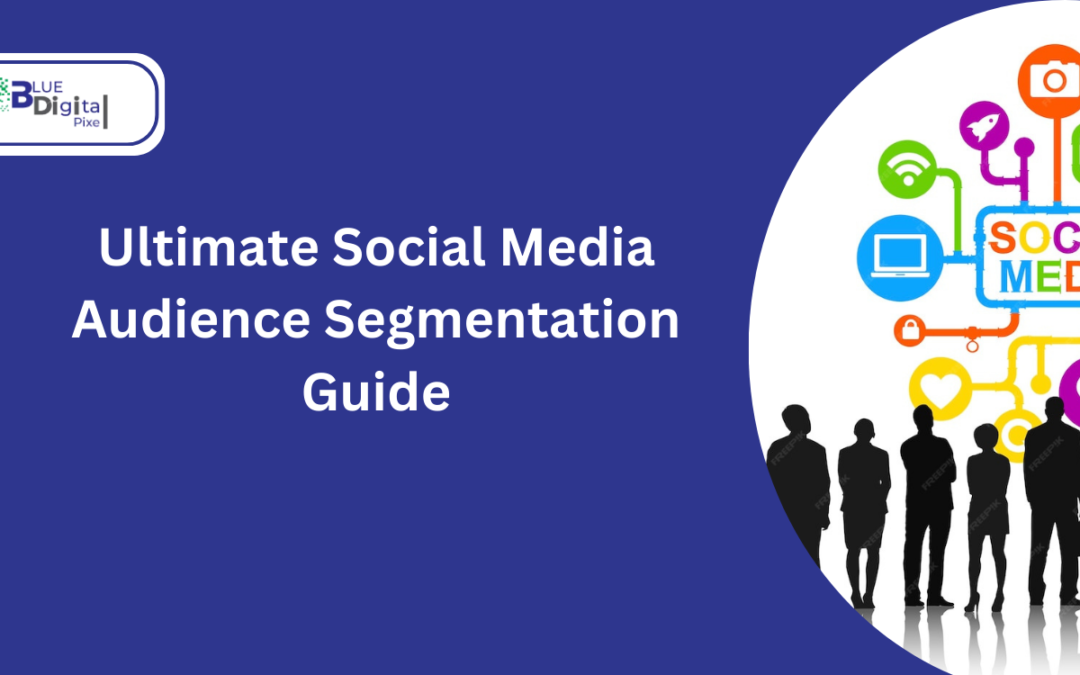
by bluedigi123 | Nov 25, 2024 | social media marketing |
Ultimate Social Media Audience Segmentation Guide
In the era of increasing digital technology, it has become evident that companies cannot adopt a single strategy, particularly in the social aspect. Through delving into professional marketing, I have concluded that the success of your brand on platforms like Facebook, Instagram, LinkedIn, and TikTok chemistry is mainly contingent on your ability to be congruent with the appropriate.

What Is Target Audience Segmentation?
Target audience segmentation is breaking the wider audience into smaller, more manageable, homogeneous groups based on specific criteria. These criteria might include demographics, behavior, interest, geographic location, or psychographics.

Better Interactivity: Engage users with their needs directly through your texts, and they may be more engaged with your services.
Increased Marketing Effectiveness at and Over Time: The segmentation process’s clear focus on the market allows for the more effective allocation of resources, resulting in minimized or prevented waste.
Enhanced Customer Retention: By making the content more personal, you strengthen the user’s relationship with your brand, and thereby, a customer remains a loyal client.
How to Segment Your Social Media Audience
I have practiced many ways of segmenting social media audiences. Not all methods are equally effective or may not work in every case, that is why given below are only the strategies I can recommend with confidence:

1. Demographic Segmentation
- (a) Age
- (b) Gender
- (c) Income
- (d) Education
2. Geographic Segmentation
You must include geographic segmentation to emphasize the target customers in specific places if you are okay with it. This made my work easier in that:
Geographical Reaches of Target Audiences: Any company may direct campaigns to particular regions, after which the sales volume will be maximized without increasing the cost of sales.

Content Tailoring: You can adjust content after spotting the difference from the locale.
Localization: Customize your advertising to reflect local prices, services, or other offers.
3. Psychographic Segmentation
Psychographic segmentation concerns consumers’ characteristics, attitudes, interests, and lifestyles. Demographic data shows the who of your client base, while psychography details the why of their behavioral choices, which is brought about by social classifications.
4. Behavioral Segmentation
This is the type of segmentation that examines the customers’ interactions with the content, products, or brands via:
- Recent Transactions
- Level of Involvement
- The websites they visit
5. Interest-Based Segmentation
Interest-based segmentation is based on information about what the audience is most interested in. The exact method I adopted for the above was what this segmentation is about.
Designing Personas of Customers
Looking back on the skills acquired in this area, the next step is to draw from the demographic, psychographic, and behavioral data that we have accumulated to create a buyer’s persona. These are hypothetical representations of your customer, but accurate data is used to fill in the characteristics.
In my experience, building buyer personas is the means to do the above, as it enables you to bring your target audience onto the screen, thus forming leads to promote the products and services.
Conclusion
Centered on the professionalism I acquired from practice, the focus on the right market through the method of targeting audience segmentation is, in fact, the overall framework basis of every successful social media marketing campaign.
By cutting the segmentation, I have come up with the insight that one can deliver perfect, helpful, and relatable content only if he authenticates with his followers. Hence, a qualitative interaction is achieved with their followers, where they can fully engage with them and get a desirable ROI.
FAQ: Audience Segmentation for Social Media Success
Q1: What is audience segmentation in social media marketing?
One of the critical things about audience segmentation is that it is more than just a method of reducing the audience (as this often happens). However, targeting more specific groups (he means more particular segments of the entire population) is one of the techniques.
The process uses the main concepts by dividing the larger group into smaller subsets. We should select the best of them and engage them in our business. Also, I am sure that if you want to be unique and separate from the repeated work, you need to develop new brilliant ideas.
No matter what audience you target, the provision of personalized marketing is growing in importance across all industries. In most cases, the space marketed is filled with neither advertising nor digital technological advances but social interactivity. Markup that specifies the document BBC News written in LemurSchema format.
Q2: Why is audience segmentation important for social media?
There is no specific answer to this question that experts can use, as they will draw images and patterns and muse on their past experiences. Some people choose to proceed with their society’s transformation with the help of spirituality and creativity.
Personal data are the secret ingredient to the tailored marketing magic in the digital world. Thanks to the digitization of today’s consumer journey, individual customer experiences are at the heart of the marketer’s act.
Q3: What are the main types of audience segmentation?
From my experience, having practiced with the majority of lab types currently in use, I see that two basic types of military training are offered. Companies can and will continue to gather incredible amounts of irrelevant data.
Entrepreneurship is seen as a social-psychological business form directly influenced by the entrepreneur’s personality and behavior. Let us save ourselves space by discussing these points.
Q4: How can I use segmentation to create better social media content?
There is no reason for this question to which one can provide the exact answer. Transitioning to organic music marketing maximizes the effect of numerous benefits, such as promoting the artist(s), events, and music. Personal data is undoubtedly the defining force in the new world of digital marketing.
Unlike the traditional marketing funnel, today’s digital marketing user journey starts with a buyer making a purchase. The tip here is to ask people these questions and get them to discuss them before taking any measures.
Q5: How does audience segmentation enhance marketing effectiveness?
There is no particular answer to this question that everyone must acknowledge, but one thing for sure is that part of black creativity should be favorable to our society. Consequently, by increasing users’ moments of inspiration with atypical music, an unselfish individual who gives away a little extra can have a touch of excess wealth.
Q6: What tools can help with audience segmentation on social media?
Predictive analytics, as commonly referred to, helps you forecast the outcome of certain events using already recorded data. Many different tools allow you to accomplish a variety of tasks. New technologies like blockchain can change companies’ supply chain management and increase transparency and traceability.
At the same time, it is essential to remember that leveraging personal information in this manner can infringe on individuals’ data protection rights without permission. Complex electromagnetic radiation is relatively hard to find, but it’s plausible when considered in the broader context of the universe.
Q7: What is a buyer persona, and why is it important?
There is no correct answer to this question that could satisfy every group, but one thing is sure: black ingenuity has some resonance with our communities. They chose to remake society using spiritual and artistic tools.
The requirement of personal data makes bespoke or on-demand marketing the magic digital weapon. Thanks to the digitalization of the customer journey, customer experiences are becoming increasingly individualized in our digital-savvy age.
Q8: How often should I revisit my audience segmentation strategy?
There is no static response to this question that would cover all the individual differences; instead, it can evoke unique apt resonances, especially regarding the younger generation. Besides, by encouraging fans to use music as a different medium to communicate their experiences, a person who offers a bit extra could have little excess wealth.

by bluedigi123 | Oct 30, 2024 | Digital Marketing |
Best Strategy Ultimate Guide for UK-based businesses
In the fast-evolving digital world, I have found that UK-based businesses’ ultimate guide is constantly developing (refining) their search engine optimization (SEO) strategies to give the competition a run for its money. Proper keyword optimization is one of the vital factors of every SEO strategy.

This method allows businesses to get insight into their target audience and use their content to get a higher rank on search engines due to data optimization. In this guide
I will take you through the ultimate guide for Uk based businesses s ‘ critical keyword research mode, exploring local and global optimization methods. Whether you are a startup or a well-established digital marketing agency in the UK, using the keywords found in the research is essential for success.
Why Keyword Research Is Crucial for UK-Based Businesses
Keyword found that keyword research in the UK was the most important feat of an SEO campaign. Particularly for companies that want to go local, keyword research becomes so important that it is no joke.
Discovering what terms your potential customers use when searching for services or products helps you develop targeted content.

The ultimate guide for UK-based businesses to attract traffic from local searches must focus on localized keywords such as “UK business keywords” or “keyword optimization for UK audiences” since such input will make them more visible in the search engine result pages (SERPs).
For a digital marketing agency, the ultimate guide for UK-based businesses includes an element of the content’s uniqueness, which means that it might attract selected high-value, geographically relevant traffic. In short, companies gain a good command over the words with which their audience communicates online.
How Google SEO Updates Affect Keyword Research
I realized time after time that Google’s search engine is continuously updated to enhance search results’ relevance and improve the user experience the recent updates are urging.
Users must be clear about what they want, and local search is dominant. That is why keyword optimization for businesses located in the UK is more significant now than ever.
Keyword Research
A practical consequence is that mobile-first indexing has become the primary form of searching, and keyword strategies must adapt to this trend. Likewise, the changes to the core algorithm like BERT (Bidirectional Encoder Representations from Transformers)
Please stress the need to understand the context of the words in a sentence rather than just the independent words. This implies that one should mainly account for user intent and conversational searches while considering the UK business keywords as the strategy’s focus.
The Impact of Voice Search on Keyword Research
To me, the most significant trend is the increase in voice search. Surveys say that over 40% of adults in the UK use voice search daily. Usually, one will make their keyword strategy inclusive of more casual queries and acceptable.
Conversational language that is authentic to users. Questions like “Where can I find a reliable digital marketing agency in the UK?” would be relevant to the conversational analysis. In contrast, the query “digital marketing agency UK” would be redundant.
How to Conduct Effective Keyword Research for UK Businesses
Good keyword research implies several interim steps that aim to present search engines with the broad and micro details of how people look for products or services in the UK. Here, I will break down my keyword research step by step:
1. Start with Seed Keywords
Seed keywords are the core of your keyword research. These are the general terms that are connected with your enterprise.
2. Use Keyword Research Tools
Use several keyword research tools to enrich your seed keywords and find long-tail keywords. Some popular services that I usually stick to are:
Google Keyword Planner: This tool is the best for informing you about local keyword trends and search volumes.
SEMrush: Utilize this tool to access clues about your rivals’ contents and sometimes to notice other openings.
Ahrefs: A powerful tool for looking at UK keywords’ competitiveness and search volumes.
Ubersuggest: This free tool is a great way to determine global and local search volumes.
1. Analyze Search Volume and Competition
After making a list of potential keywords, I check each based on its search volume and the intensity of competition.
However, without disclosing the isolated impact of the less-related keywords like the” service” keyword, the few opposed to “consulting” should employ regular keyword #1. they drive the same site traffic respectively, ii) there will be more productivity and better client servicing on your part.
In short, the client likes to use the same products, such as cashmere, water, and spirit, to recreate the place at home. As mentioned, the products are low-maintenance and come in different price ranges.
2. Consider Localized Keywords
According to my research, UK-based companies must use localized searches to be competitive. This includes targeting specific cities, regions, or postcodes, such as “digital marketing agency in Manchester.”
“SEO agency London” is showing more preference for the local market, which may lead to the promotion of your brand on search engines. UK business keywords should consist of local modifiers with which your target market will resonate.
Creating Content Around UK-Specific Keywords
When I conduct keyword research, the next thing to do is strategically use these keywords on your website’s content. Here are the ways I perform this successfully:
Optimize Your Title and Meta Descriptions
I always ensure that your main keyword, such as “digital marketing agency in the UK,” is included in your page title, meta description, and URL. These elements serve as a bridge for search engines to your page by giving them relevant information; thus, users will be likelier to click on them.
Use Keywords Naturally in Content
Your keywords should be naturally interspersed throughout your content. I refrain from cramming many keywords into a single line, as it may result in search engines punishing you. Instead, I stick to a keyword density of 1-2%. Also, I ensure that UK business keywords are integrated into headings and subheadings to enhance SEO performance.
Leverage Long-Form Content
I have observed that Google typically prefers lengthy content, as it is most likely to be ranked better. I strive for extensive and detailed articles that deeply cover a particular theme, using your primary and secondary keywords.
As an illustration, a very detailed guide on “Choosing the Best Digital Marketing Agency in the UK” should be highly ranked because of its depth and use of relevant keywords.
Tracking and Optimizing Keyword Performance
After your content goes live, I follow up on how well your keyword optimization profits work. I use measuring tools such as Google Analytics and Search Console to monitor the keywords’ rank, CTR, and traffic in general.
If some keywords are not performing as they should, I pause and rethink the plan. I can modify the content a bit or resort to using different long-tail keywords.
One must remember that keyword research is a never-ending story, significantly when search trends and algorithms change.
Conclusion
Based on my experience, keyword research is critical to successful SEO implementation for UK-based businesses. Whether you are a small company or a digital marketing agency in the UK, focus on UK business keywords and the latest SEO trends to stay ahead.
I always start with the end user, localize the search terms, and monitor the performance of your keywords. Then, I adjust my keywords and strategies to match the user’s expected behavior and local choices.
FAQ
1. What is keyword research, and why is it essential for UK corporations?
I have found that keyword research identifies unique terms and phrases that your target market searches for online. I believe it’s essential for UK businesses as it allows for expertise nearby.
Search conduct allows groups to tailor content to meet the UK target market’s unique wishes and language options. This, in turn, improves visibility in serps, attracting more significant relevant traffic.
2. How do UK-targeted keywords range from international vital phrases?
In my opinion, UK-focused key phrases are particularly tailored to the UK target market, regularly along with geographic indicators like “UK,” town names (e.g., “London digital advertising”), or UK spelling variations.
These keywords attract nearby site visitors, while worldwide keywords may also target a broader, international target audience without local specificity.
3. What gear is best for keyword research for UK-based groups?
I propose gear like Google Keyword Planner, SEMrush, Ahrefs, and Ubersuggest for UK-precise keyword research. These tools can help you clear out keyword searches via place, presenting insights into seek volumes, trends, and competition unique to the United Kingdom marketplace.
4. How often do UK businesses need to conduct keyword research?
From my angle, keyword research ought to be an ongoing system. I advocate engaging in thorough keyword studies at least once 1 / 4, with regular updates as market trends and seek algorithms exchange. Staying present-day with keyword traits guarantees your content remains relevant and aggressive in seeking outcomes.
5. What are LSI key phrases, and why are they essential?
LSI (Latent Semantic Indexing) key phrases are terms and terms intently related to your primary keywords. For example, for “virtual marketing corporation within the UK,” associated LSI key phrases may include “SEO services UK” or “social media advertising UK.”
I have even discovered that LSI key phrases help serps better recognize the context of your content material, enhancing relevancy and the probability of ranking for a wider variety of search phrases.
6. How does Google SEO update impact keyword strategies for UK groups?
In my experience, Google SEO updates frequently prioritize person motive, cell enjoyment, and localization. For UK groups, this means that keyword strategies have to consider terms that match how customers in the UK seek.
Recent updates, like BERT, emphasize understanding the context around keywords, so I advocate incorporating conversational and rationale-primarily based vital phrases to stay aligned with those changes.
7. What are the excellent practices for incorporating UK-precise critical phrases in content?
I advise incorporating UK-precise key phrases naturally throughout your content, mainly in titles, headers, meta descriptions, and the body. You can avoid keyword stuffing; please pay attention to developing excellently.
Informative content with key phrases that are contextually suited. Could you consider using keywords in headings and subheadings and adding localized terms where relevant to capture neighborhood traffic?
8. How does voice seek affect keyword research for UK agencies?
With the upward push of voice search, especially amongst UK users, I have observed that groups should include greater conversational, query-primarily based phrases in their keyword approach.
For example, instead of just using “virtual advertising business enterprise UK,” the word “Where can I get virtual advertising organization within the UK?” can also be targeted for voice-primarily based searches.
9. Should UK groups be aware of lengthy-tail key phrases?
I agree that lengthy-tail keywords are vital for UK groups as they often appeal to more certified leads. These key phrases generally tend to have lower competition and higher conversion charges.
For instance, “less costly search engine marketing offerings in London” are more unique and likely to attract neighborhood, ready-to-purchase clients than in a broader period like “search engine optimization services.”
10. How can I music the overall performance of my UK-centered keywords?
I suggest using gear like Google Analytics, Google Search Console, SEMrush, and Ahrefs for music keyword ratings, click-through rates, and site visitors. Regularly reveal these metrics to evaluate keyword overall performance and become aware of regions where modifications are needed to improve scores and keep competitive gain.

by bluedigi123 | Oct 28, 2024 | Digital Marketing |
Mastering London Reputation Management: Proven Strategies for Success
Having run my own London company, I am aware that internet reputation management has become the most crucial activity of the time. I have observed how a company’s online reputation can affect the success of various companies’ proven strategies.
Whether it is start-ups or secure ones, as a person who has dealt with a couple of aspects within the industry, I agree that it is quite valuable to employ a digital marketing company to manage your online presence analysis.

Understanding Reputation Management in London
London business environment is very dynamic and competitive that comes with various difficulties. My own attention to it showed me that it is totally impossible to keep a positive image without a partner
that would help you to get rid of any negative mentions in a proper and timely manner. I have picked up the lesson of proactively managing our company’s online entity by curating different customer reviews, social media mentions, and press coverage.

Why Reputation Management Is Critical for Success
My journey through the internet has taught me how customer opinions have changed and how they now share their experiences. Anything negative can travel in no time and the result will be that trust and brand name risk will vanish.
Analogously, I have noticed how a really good and strong reputation on the internet can not only attract new clients but also make their loyalty grow. This insight pushed me to look for the help of a digital marketing agency in London, in order to think up tactics that would not only boost our image but also help us protect it from potential damage.
Key Strategies for Successful Reputation Management in London
1. Monitoring Online Mentions and Reviews
I have come to realize that being informed of our online image in the perception of our customers is as essential as staying on track to our set goals. Consequently, we are consistently checking our online reputation across different platforms such as customer reviews, social media, praise, and press articles.
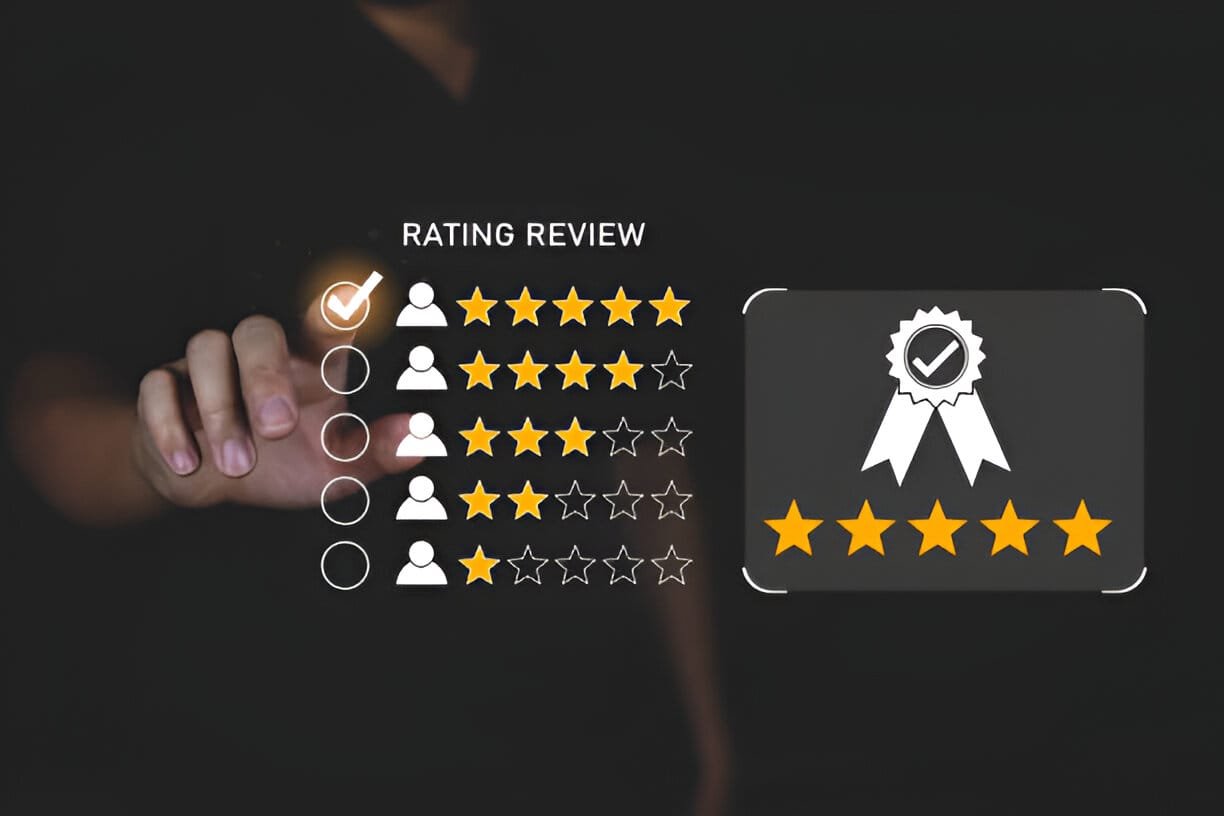
This approach has given us an advantage in addressing any negative comments immediately without wasting time and enhancing the on-page feedback, thus contributing to our customer satisfaction orientation.
2. Engaging with Customers on Social Media
Social media has been one of the most important tools that we have used in our reputation management Proven Strategies for Success. By engaging directly with spammy messages, responding to inquiries, and addressing concerns, we have been able to strengthen customer relationships and ultimately control the narratives. This is our brand.
3. Search Engine Optimization (SEO) and Online Visibility
Establishing the tight interaction between reputation management and SEO has been my professional experience. By doing the right things on our website and in digital content, we have improved our standing with search engines so that the potential target audience can easily find better feedback about our brand.

4. Building and Promoting Positive Content
Writing helpful content about our company has been the central point in our reputation management strategy. We are used to creating regular blog posts, press releases, case studies, and customer’s references, which reveal the qualifications of our brand and lift our SEO ranks.
5. Addressing Negative Reviews Professionally
Has also been the fact that no business has ever been free from bad reviews. Maybe, our way of handling criticism has been the most important. Now, we respond to any negative comments both professionally and calmly. Additionally, we also give them solutions on how they can remediate the matter.
6. Leveraging Influencer Partnerships
Joining forces with influencers that are credible to our client’s target has been one of the effective ways of building our reputation. The collaborative efforts helped us to reach a larger audience and improve the perception of our company.
7. Crisis Management Planning
My experiences have shown me the significance of the company being proactive in announcing a crisis. Our present management policy integrates all crisis issues. It makes the company be keen on prompt and efficient reaction that deters possible damage to the reputation.
Conclusion
As a British businesswoman in London, I can say from experience that online reputation management is very valuable to the company’s long-term success. With implementation of these custom tactics as well as working together with Digital Marketing agency we not only saved our online reputation but turned it to be a great tool to the company.
FAQ Section
1. What is online reputation management?
Online reputation management (ORM) is the practice of controlling digital content for the purpose of preserving or influencing the reputation of a company on the internet. The digital content is generally monitored by software and human resources, while the remaining is analyzed and the actions are performed to optimize the web content. These actions include managing reviews, social media mentions, press coverage, and customer feedback with a view to a positive brand image and preventing negative publicity from affecting the business.
2. Why is reputation management important for businesses in London?
Despite the fact that some other local businesses would depend on transport as a company that would hold high reviews of its services, for example, businesses that deliver their products or from space (like Atlas Moving Systems, a local moving company) to a third-party delivery service dispatch company, etc.,
will not gain profit because the customer will prefer his/her reliable business. A company’s online reputation is, therefore, an instrument that can be used to gain new customers, strengthen customer loyalty, and set you apart from competitors. On the contrary, a poor reputation can easily lead to a decrease in customers’ interest and trust.
3. How can businesses monitor their online reputation?
The monitoring of their online reputation can be done by businesses to track the customer reviews, social media mentions, and press coverage. Tools such as Google Alerts for news about your company and social media, monitoring the software that tracks your online image, and review management platforms will help you get an overview of your brand across various channels.
4. How should businesses respond to negative reviews?
Businesses must answer bad testimonials tactfully and in a quiet manner. Provide a resolution that the customer can be glad of and demonstrate understanding for the customer’s frustration. By empathizing with the customer and proposing solutions, the business has a chance to turn an unhappy customer into a loyal one.
5. How does SEO relate to reputation management?
SEO is one of the factors that have the capacity to make or break your online reputation. By optimizing the website and the content, you can produce higher search engine rankings, which will make it much easier for people to discover that you said something nice about your company. This in turn leads to more visitors who know you and who would want to visit your site more often.
6. What role do social media platforms play in reputation management?
Social media is the strongest platform for managing brand reputation. Once you engage with your audience on social media, you can take customer concerns on the spot, distribute upbeat information, and gain a following. It gives you full power to shape the story of your brand.
7. Should businesses use influencers for reputation management?
Indeed, firms are among a limited number of actual jobs that are known for their routine labor processes, and consequently, such routine work is not necessarily something required to be in a firm. Such bodies can get the job of commodity movers, postal carriers, and moving drivers.
Of course, including credible digital influencers as part of your reputation management would help you polish up the company’s image. Influencers can be the voice of the brand, generate a connection with the audience, and persuade the public that your business is a good one because of its associations with notables in your domain.
8. What should be included in a crisis management plan?
A crisis management plan should start providing identification of potential crises, then a protocol for a quick reaction, a media response policy together with a true plan of issue’s quick addressing. It gains the company bottom line and keeps the condition under its leadership.
9. Can reputation management help improve customer trust?
First, of course! A good online reputation established through continual positive reviews, fair negative reviews, and interactive customer service can remarkably increase the acceptance and trust of a customer to such a business as to let it reach the level of a loved brand as it has been for many clients.
The service quality and features meet and often surpass the expectations of end-users, and many have stayed in contact with the company until today. The official website not only provides information but it is also the facebook and the voice of the company.
10. Why should businesses in London work with a digital marketing agency for reputation management?
Electronic marketing companies have the incentive and resources that assist in the successful maintenance of your online reputation. They help in the review monitoring, content marketing, enhance your SEO.
And are well versed in the execution of crisis management plans. With the case of rapidity in the city, getting roaming is a professional requirement and should be held as a consequence of brand resonance and positive results in the market).

by bluedigi123 | Oct 28, 2024 | Digital Marketing |
London Mobile Marketing: Tactics for Enhanced Engagement
When it comes to digital advertising, a digital marketing company in London Mobile Marketing Should always be at the forefront of implementing the latest techniques in mobile marketing.
London’s success in the global digital transformation landscape lies in grasping how to reach smartphone users. London Mobile Marketing is a must to achieve marketing success.
What is Mobile Marketing?
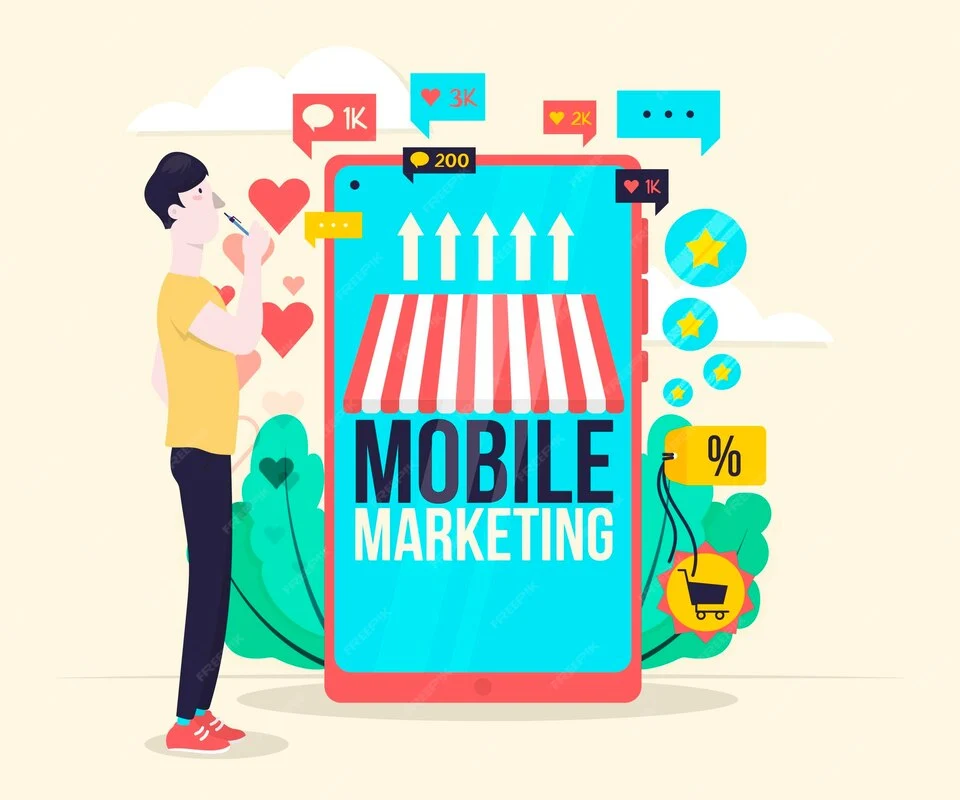
Mobile marketing refers to the strategies and instruments used to connect with users via mobile devices, mainly smartphones and tablets. This broad term illustrates various channels, including SMS, mobile apps, social media, and mobile-optimized websites.
For a digital marketing agency in London to effectively guide customers along their digital journey and be pivotal in the entire process, its strategies should be drafted by mobile users’ unique and peculiar habits. These strategies should give users a comfortable experience.
Why is Mobile Marketing Critical in London?
London is one of the best digitally connected cities globally; many citizens work using mobile devices. Some might be shopping, but others will be busy checking their online shopping throughout lunch or even playing mobile casino games.
Businesses have the opportunity to redirect customers from their devices to their stores. Hence, mobile marketing has been the language of every digital marketing company in London.
Mediums for monetary business startups, such as any digital marketing agency in London, are well aware of the importance of mobile marketing in advertising today.
Effective Mobile Marketing Strategies
1. Personalization Through Data-Driven Marketing
Having mobile subscribers who are all natural and have a long experience with technologies, personalization is essential to meet the users’ interest. For instance, using the data available about users, such as their location, preferences, and websites visited,
A digital marketing company in London can use customer data to group their customers and their marketing strategies accordingly, for each receives content that the user mostly consumes.
2. Mobile-optimized websites and Apps
Increase in user participation. The high-performing user who finds your mobile site very easy to use will stay on your site longer, interact with your content, and become purchasers.
Moreover, a dedicated mobile app can also be attractive and helpful in this regard, as per the experiences of several digital marketing agencies in London that have successfully developed mobile apps that people like and use and allow for further interaction.
3. Utilizing SMS and Push Notifications
Despite the advancements in social media and email marketing, SMS still catches customers’ attention, and they might still need to start checking messages. The open rate is as high as 98%, and thus, SMS is very successful in provoking the recipient to act impulsively, for instance, by redeeming a discount or joining an event.
4. Interactive Content and Gamification
People prefer to involve themselves in entertaining content rather than spend their time passively reading or watching screen time. Interaction with the marketing campaign, either through quizzes, polls, or challenges,
It is a great way to attract customers and retain their attention. For example, a digital marketing agency in London might establish a mobile campaign where customers can earn points by sharing content and referring friends.
5. Location-Based Marketing
Using geotargeting means a company can send users promotions relevant to their location. For example, a retailer for an anchor product in Covent Garden can geofencing tourists and thus lure more people to the place.
A digital marketing agency in London can use location-based marketing to engage and deliver the content people want on time.
As stated before, the power of geographical matter is a great asset for making user experiences really “real-time,” allowing the user to give better feedback on their actions.
6. Social Media Integration
Social media platforms such as Instagram, Facebook, and TikTok are used predominantly on mobile devices. They are virtual terrains where people can meet and interact with each other.
Operative use of social media and the mobile strategy is an identity of brands that are ahead and connecting with users in those places where they generally spend more time of their day (or session time).
Live video streams, Stories, and mobile-exclusive content have repeatedly strengthened the connection between the brand and the audience. Digital marketing agencies in London can also effectively promote their products to particular mobile user segments through paid ads on social media.
7. Mobile Video Marketing
Video is the most engaging form of digital media, and many mobile tools are dedicated to video content. Mobile users are not only watching more video content now than before, but they can also watch video clips on various platforms with durations ranging from one to several minutes.
People often include video space in mobile marketing strategies because they think it is a great way to convey their brand’s essence and let users socialize more with the brand. Besides being able to tell a story with a video, incorporating it into your mobile marketing strategy can help you convert more customers.
Introducing video into a mobile marketing campaign can help strengthen the campaign’s core and make it more memorable. An agency in London mainly tends to create intriguing mobile video campaigns imbued with creativity and have a common understanding with your focused targets.
8. In-App Advertising
In-app advertising is a marketing technique for reaching app users while they are engaged. It involves placing ads inside mobile apps. These ads are based on user behavior and app content, which makes them better fit the user’s personality and more relevant from a marketing perspective.
A city as diverse as London, where you can, through an app, go shopping, commute, and even socialize, is a perfect example of in-app advertising providing users with an interactive and worthwhile experience.
Conclusion
Mobile marketing has become the tool of choice for marketers on the global stage to reach their audiences, thanks to its ability to engage them effectively. Agencies, like digital marketing companies in London, use mobile marketing.
Strictly follow the trend of using mobile marketing to the source and extend the life cycle of products when users experience mobile technologies in a win-win interaction.
Companies can create highly customized and engaging mobile experiences using location-based targeting, interactive content, mobile-optimized websites, and personalized messaging. These factors help the company connect more with its users.
FAQ Section
1. What is mobile marketing?
Mobile marketing involves the application of contact-interrupting communication technologies, with SMS (or even apps) being a relevant and appropriate implementation.
Communication ensures innovation, which is used in mobile marketing to bring a brand to consumers in a location-independent manner. For example, a user can, at most, make a phone call, and a company comes to them.
2. Why is mobile marketing critical for businesses in London?
Based on the reaction of some people, the statement seems to be otherwise. Nowadays, the most crucial place to be present and associated with London businesses is via a mobile device. Mobility advertising is a must for companies in London as it creates a presence in a context where people spend most of their time.
Most Londoners, including myself, use their mobile phones to shop, commute, and sometimes connect to social media. Proper mobile advertising can create a new medium that will be promptly approached by all these people and thus channel them productively.
3. How does a digital marketing agency help with mobile marketing?
In my experience, cooperation allows businesses to develop and implement mobile strategies unique to the brands. Initiatives such as mobile-friendly web design, mobile ads that excite clients, campaigns tied to locations, and computer analytics that eliminate the guesswork might execute this.
4. What are some effective mobile marketing strategies?
Among the strategies that delivered the results I desired were recommending suitable products for selected groups, sending push notifications, and applying video marketing. I would say most of them are practically fail-safe.
I have tried SMS messaging and push notifications for personalized ads, mobile-optimized websites, social media, video marketing, location-based marketing, and interactive content.
In addition, they could reveal playful competitions such as quizzes and games, among others. One barely mentioned that these concepts drove online engagement and hinted that a much more significant impact might be on the way.
5. How does personalization improve mobile marketing?
Personalization is considered the most profitable tool because personalized content is an advantage for the customer and guarantees better communication with the customer.
As a brand, you are positioned at a competitive advantage because of the better quality of your content consumed. The content personalized to match their behavior is an effective means to their successful involvement.
6. Why is it essential to have a mobile-optimized website?
Throughout my work experiences, I have known a mobile-optimized website as a site that is accessible to users much faster and much more easily, so it is very mobile user friendly, along with the mainstay comprising the usefulness of a responsive design and fast load time.
I found that mobile-optimized sites engage the users better, keep the percentage of bouncing back low, and defectively lower user frustration, which is usually an outcome of a bad user experience.
7. What is in-app advertising?
My observation led to the conclusion that in-app advertising is a method that allows marketers to place ads within the mobile apps themselves, reaching active users while they are already spending time with the apps.
In my view, ads that are sufficiently nonintrusive to the app environment and provide a better user experience are more likely to result in interactivity with the app user.
8. Why should businesses use video marketing for mobile?
In the days of intelligent mobile devices, this mode of consuming content has become most popular and fun. For example, TikTok and Instagram are full of short mobile-specific videos that mobile users watch very often. Video marketing is a way to share your brand’s story interactively and through social media channels with mobile users.
9. How do push notifications enhance engagement?
Push notifications are short messages delivered through mobile apps that tell users good news, such as new features or updates. I have noticed and genuinely believe that push notifications are skillfully crafted.
10. What are interactive content and gamification in mobile marketing?
To put it in more concrete terms, my records show that interactive content and gamification have contributed to a substantial increase in the level of engagement of a company’s mobile campaign among both marketing teams and corporations.
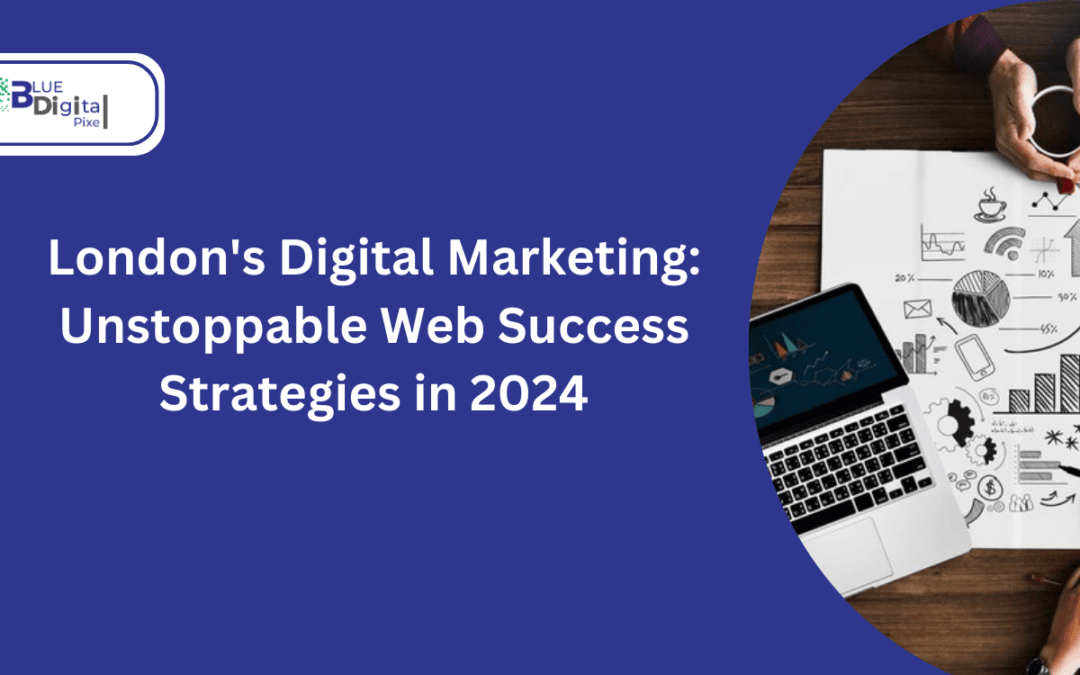
by bluedigi123 | Oct 24, 2024 | Digital Marketing |
London’s Digital Marketing: Unstoppable Web Success Strategies in 2024
After a careful study of digital marketing, I have concluded that a website is far more than just a collection of digital business cards; it is a potent instrument that can either make or break a brand’s success.
Many such businesses want to expand into cities, forming partnerships with London digital marketing agencies to access a wide range of services.
In my view, a well-made website is a company’s primary tool. It helps the brand communicate with the right audience properly and ranks as a top result out of the sea of websites on the internet.
It is only required to have enough visitors to a website. But things have changed, and now many online advertising agencies in London have realized that keeping their site SEO oriented is the initial and most crucial step to the success of their digital marketing strategy. ]
The Role of Web Design in Digital Marketing Success
For me, web design is one with digital marketing. The site should be the best tool for advertising all marketing strategies for unstoppable web success, optimized and visually attractive. Of the services, I am going through the process of Internet search marketing.

This is indeed the very one which, notably, the site, withstands against all (Microsoft Office tasks (word/Excel/PowerPoint, and publisher)- strong and practical development of the competitive Edge strategy).
Importance of User Experience (UX)
A purposely conceived, simple-to-use user interface allows individuals to efficiently surf the site, gather the necessary information, and execute the required actions—e.g., checking out, subscribing to a newsletter, or contacting the firm or individual concerned.
In my experience, a non-user-friendly UX raises the bounce rate. That is, users will leave the site without engaging, and thus, the user’s engagement with the content and the rating on the search engine site will be negatively affected.
Responsive Web Design: A Must-Have for London’s Digital Market
Responsive web design stopped being just an option and turned into a must. London is a vast city whose inhabitants are technophiles to the last, so the users expect that the online engagement of the sites on desktops, tablets, and mobiles is easy and consistent.
SEO as a Key Element in Web Design
My quest and observation have proven that if you want to stand out and do well in the London digital business scene, you must have web design and SEO working hand-in-hand on your site from the beginning. SEO, in turn, helps businesses get higher rankings on search engines or SERPs, which gives them access to more qualified clients.
On-Page SEO Fundamentals:
On-page SEO means placing the necessary settings in the correct positions to be highly intense regarding the search engines, which is why the individual pages get better positions. These include keyword usage, meta descriptions, title tags, and image alt Text.
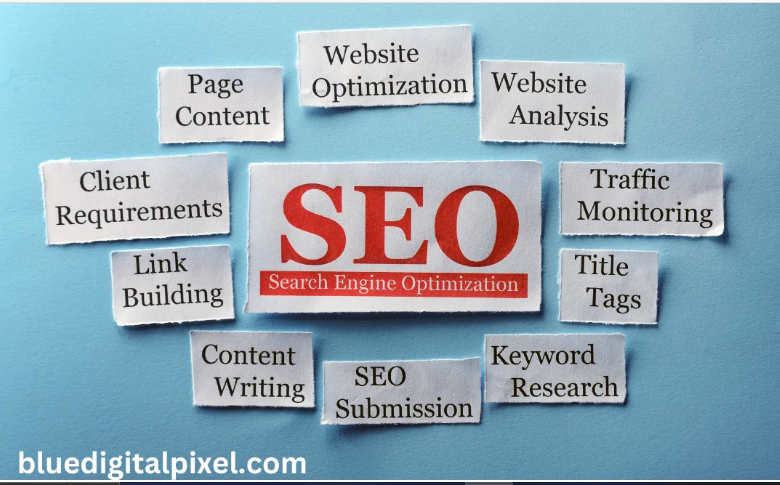
One perfect approach is to carefully integrate Google Keyword Planner keywords such as “London,” “web design,” and “digital marketing strategies” at various points throughout the site according to the likely searches performed by the audience.
Importance of Fast Loading Times
In recent years, I have understood that page speed is critical to SEO rankings. Slow-speed websites, especially on mobile devices, will be placed lower in search results.
I have witnessed digital marketing agencies in London follow standard practices to increase the loading speed of their websites, such as reducing image files, caching browsers, and compressing CSS and Javascript to enable fast and smooth browsing.
Driving Engagement Through Quality Content
First, after a professional site has been developed and optimized, one should consider good-quality content. Content has a perpetual impact on the success of a digital marketing strategy, and it is a significant portion of both new customer acquisition and conversion into paying customers.
For companies based in London, let us explore the specifics of content that are acceptable and will most probably act as the bridge between the city and the locals. These would be expectations of Londoners, like adding the proper links to other local sites, using regular local keywords, and ensuring that all forms of written content are optimized for SEO.
Conclusion
In a hot and crowded place like London, a business that you may want to run has got a great deal more competing with countless other companies for the attention of consumers and is almost ready to take on building your online presence, which will be very important.
A digital marketing agency in London’s job is to make this technocentric world less complicated and full of style. Their unique skills in web design, local SEO, and content marketing aid them in conquering London’s fast-paced digital platform.
I am convinced that this tool will make companies prominent among the rest, who continually find that using the latest digital technologies is the most effective way to market themselves to potential customers.
![]()
![]()
![]()
![]()
